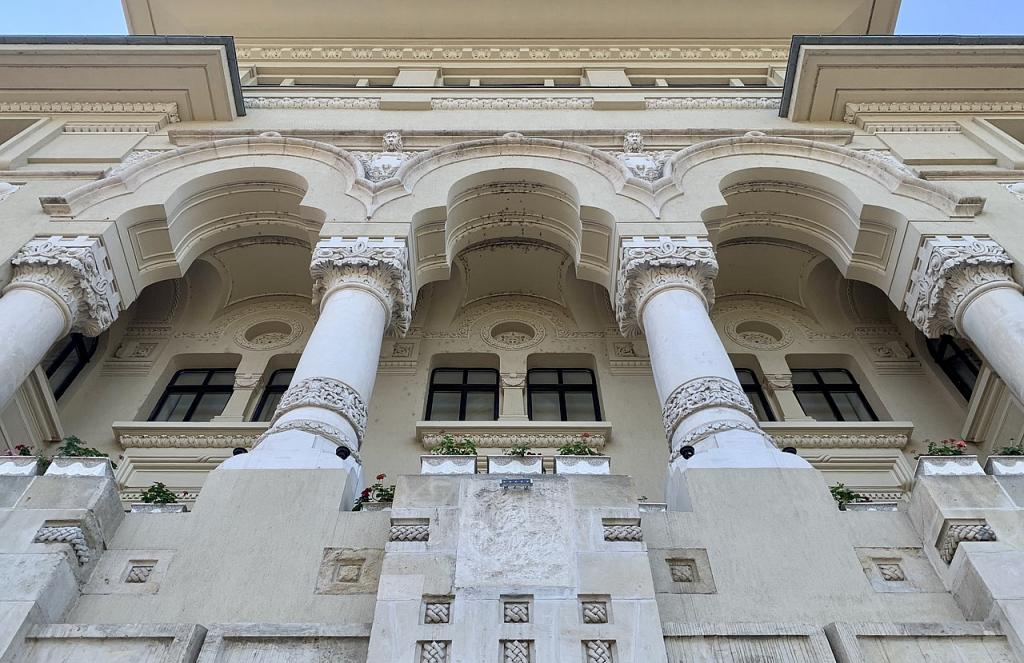Thessaloniki gets ready for its metro launch in November
The underground rapid transit lines have been under construction for almost two decades due to various project delays
 TheMayor.EU logo
TheMayor.EU logo 
Detail of the municipal building in Bucharest, Source: Neoclassicism Enthusiast on Wikipedia, CC BY-SA 4.0
Considering Bucharest's razor-thin budget margins, the mayor explained that without a subsidy, 2022 will be a year of cut spending after years of austerity
During the weekend, Bucharest mayor Nicusor Dan met with officials from the national government to discuss a possible subsidy for heating in the city. Today, in an attempt to balance the local budget, he proposed a massive 70% increase in consumer prices to cover the rising cost of heat production.
Currently, the local government covers around two thirds of consumer heating costs, and despite rising prices, Mayor Dan aims to keep that ratio.
In a press conference after Saturday’s meeting with the government, the mayor explained that consumer prices need to go up, as production prices have doubled. At the same time, if the government does not do anything to help the local budget, Bucharest will have a difficult time fulfilling its financial obligations.
According to Nicusor Dan, currently, the city’s budget margins are razor-thin and there is no surplus. If the government does not step in, in his opinion, local authorities will be forced to institute further austerity measures by postponing major development works, debt payments and by avoiding expenses on, as he put it, ‘nonsense, concerts, fairs and other things’.
Currently, there are over 500,000 apartments in the Romanian capital, which are connected to the central heating system or roughly 70% of the overall housing stock. The price of heating is measured in gigacalories. One gigacalory is roughly the equivalent of energy needed to heat one room per month during the winter.
The price of a gigacalory right now is around 33 euros. In the mayor’s proposition, that number would increase to 56 euros. For comparison, the production and distribution prices have also seen a major increase from around 100 euros per gigacalory to around 200.
The difference between consumer and production prices in Bucharest is covered by the local government’s budget, thus, the increase would put a major hole in city officials’ plans for 2022.
During Mayor Dan’s meeting with government officials, after he petitioned for aid for the gigacalory situation, he also raised the question of Bucharest’s overall budget. According to him, the capital city has been operating in an emergency austerity mode for years now and it needs additional funds to do big infrastructure projects.
One such project is the modernisation of the district heating system. The city has managed to update just over 10% of the distribution infrastructure. According to ELCEN, the local heating company, the registered losses in 2020 were more than 2 million litres per hour. Furthermore, last year, many buildings were left without hot water due to system failures.
According to AGERPRESS news agency, the government is currently looking to revise municipal budgets across the board. For this purpose, it has commissioned a 600,000-euro feasibility study to determine the best course of action. At the same time, the Minister of Finance Adrian Câciu, who stepped into office last Thursday, had a lukewarm response to the subsidy proposition.

The underground rapid transit lines have been under construction for almost two decades due to various project delays

Now you can get your wine in Talence by paying directly in Bitcoin

That’s because the state has to spend money on updating the railway infrastructure rather than subsidizing the cost of the popular pass

Rethinking renewable energy sources for the urban landscape

The examples, compiled by Beyond Fossil Fuels, can inform and inspire communities and entrepreneurs that still feel trepidation at the prospect of energy transition

Now you can get your wine in Talence by paying directly in Bitcoin

The 10th European Conference on Sustainable Cities and Towns (ESCT) sets the stage for stronger cooperation between the EU, national and local level to fast track Europe's transition to climate neutrality.

At least, that’s the promise made by the mayor of Paris, Anne Hidalgo

The underground rapid transit lines have been under construction for almost two decades due to various project delays

At least, that’s the promise made by the mayor of Paris, Anne Hidalgo

Hostal de Pinós is located in the geographical centre of the autonomous region

Despite its church-y name, the district has long been known as the hangout spot for the artsy crowds

Urban dwellers across the EU are having a say in making their surroundings friendlier to people and the environment.

Forests in the EU can help green the European construction industry and bolster a continent-wide push for architectural improvements.

Apply by 10 November and do your part for the transformation of European public spaces

An interview with the Mayor of a Polish city that seeks to reinvent itself

An interview with the newly elected ICLEI President and Mayor of Malmö

A conversation with the Mayor of Lisbon about the spirit and dimensions of innovation present in the Portuguese capital














